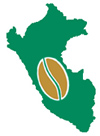 |
Junta Nacional del Café
(National Coffee Board)
|
15 years developing the Peruvian coffee industry
ACHIEVEMENTS,
CHALLENGES AND COMMITMENTS
In 1993, our coffee plantation regions were plagued
by subversive violence, causing, among other evils,
the dismantling of cooperatives and the migration of
thousands of agricultural families to other regions.
The
price of coffee paid to producers had been at its
lowest for several years. At that time, the country
exported 1 million 58 thousand quintals for a value
of US$ 60 million dollars.
That was when, with the aim of overcoming this
social and political crisis, the associations
grouping coffee grower cooperatives formed the
National Coffee Board (JNC), as an
institution that would represent and defend the
interests of coffee growers. It was founded on
January 6, 1993. From that day on, 15 years ago, the
JNC has been working tirelessly to develop the
Peruvian coffee industry.
In
2008, our country will become the world’s 6th
largest aromatic grain exporter and the world’s top
exporter of organic coffee and specialty coffees. To
achieve this we will have to export more than 600
million dollars worth of coffee, that is 10 times
more than in 1993. Among other contributions, we
will contribute 45 million daily wages to coffee
production and harvesting.
These
advances have been possible thanks to the efforts of
150 thousand coffee growing families and thousands
of leaders and technical specialists of the 59
cooperatives and 240 associations grouped in the JNC,
who took on the tasks of improving the quality of
the product, transforming conventional coffee
plantations to organic and sustainable methods, and
regenerating and preserving biodiversity in the
hillsides of our inter-Andean valleys.
The coffee exported to the international market by
our 28 cooperatives obtained FOB prices above the
national mean registered by Customs. Moreover, our
cooperatives have been making significant
investments in machinery and industrial equipment,
promoting Peruvian coffee around the world, and
diversifying family income. They receive technical
assistance from 98 professionals working in the
field, who also provide support in cooperative
business management.
All of
these advances have been achieved in spite of an
obstructionist State that hinders the business
development of family-based coffee production.
To such an extent is the government obstructionist
that the Minister of Agriculture, Ismael
Benavides, is rashly and imprudently seeking to
discredit the efforts of thousands of small coffee
growers who built the first coffee cooperatives 45
years ago.
By working in cooperatives and associations, we are
more effective in reducing extreme poverty in the
Sierra and Selva regions, combating the illegal
economy and contributing to secure social peace in
our country. We are, therefore, the vanguard of
associativity in Peruvian agriculture, WITH
SUCCESSFUL RESULTS, in spite of the adverse
political, ideological, economic and taxing
conditions.
In these 15 years of fighting against adversities,
we have also learnt significant lessons. There is no
time to lose, and it is now, when we have reached
our institutional maturity, that we must tackle new
challenges, such as developing and implementing
effective policies aimed at attaining
competitiveness and profitability, both economically
and socially, in the 338 rural districts and 67
provinces devoted to coffee growing.
With this in mind, we have committed ourselves to:
1) Developing an institutional framework for coffee
production, with independence and executive roles,
in line with the country’s process of
regionalization.
2) Implementing measures to enhance productivity and
quality.
3) Formalizing the activities of small coffee
growers and establishing business associations among
them.
4) Promoting legal economic activities in the
regions afflicted by violence.
5) Incorporating the Selva region to government
promotion programs similar to the ones in the
Sierra.
6) Incorporating coffee as a flagship product and
carrying out promotion actions, in coordination with
legitimate institutions that represent the coffee
chain.
7) Formalizing the land ownership of producers
and conducting a general registration, among other
measures that the JNC has been proposing for years..
THERE IS NO TOMORROW WITHOUT COFFEE
MORE COFFEE……MORE COUNTRY
Cesar
Rivas Peña
President of the Governing Committee of the JNC
Lima, January 7, 2008